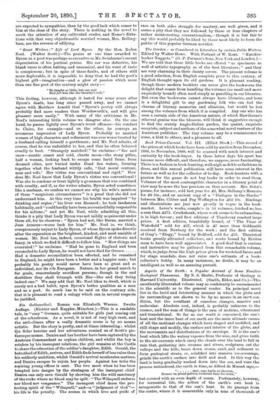"Great Writers :" Life of Lord Byron. By the Hon.
Roden Noel. (Walter Scott.)—The praise at one time awarded to Byron as a poet was perhaps as excessive as Mr. Swinbiume's recent depreciation of his poetical genius. His ear was defective, his blank verse is often halting and unmusical, and his want of taste is conspicuous; but in spite of these faults, and of others still more deplorable, it is impossible to deny that he had the poet's highest gift—imagination--and a glow of passion which more than one fine poet of the century might envy :— " He taught DB little, but our soul
Had felt him like the thunder's roll."
This feeling, however, although it lasted for some years after Byron's death, has long since passed away, and we cannot agree with Matthew Arnold that "Byron's poetry will always probably find more readers than Wordsworth's, and will give pleasure more easily." With many of the criticisms in Mr. Noel's interesting little volume we disagree also. On the one hand, he passes lightly over Byron's worst offences—his conduct to Claire, for example—and on the other, he conveys an erroneous impression of Lady Byron. Probably no married woman of high character and refinement was ever worse treated by a husband calling himself a gentleman ; and Mr. Noel admits, of course, that he was unfaithful to her, and that he often behaved cruelly to boot. "Strangely matched !" he exclaims—" fire and snow—erratic comet and cold, chaste moon—the stony pillar, half a woman, looking back to escape some lurid fume, from doomed cities, now buried under Dead Sea waters, forming together what the husband wittily calls, that moral centaur, man and wife.' Her virtue was conventional and rigid." How does Mr. Noel know that Lady Byron's virtue was conventional ? Was she to condone or treat lightly a grossness that was combined with cruelty, and if, as the writer admits, Byron acted sometimes like a madman, we confess we cannot see why his wife's mention of these "suspicious circumstances" is a proof that she did not understand him. At this very time his health was impaired "by drinking and orgies ;" his liver was diseased ; he took laudanum habitually, and " could hardly have been accounted fully responsible for his actions ;" and yet Mr. Noel, while admitting all this, thinks it a pity that Lady Byron was not mildly acquiescent under -them all, for he observes : "Byron had not, like Burns, married a Jean Armour—worse luck for him." Mr. Noel is, we think, conspicuously unjust to Lady Byron, of whom Byron spoke directly after the separation as the brightest, kindest, and most amiable of women. Mr. Noel has, indeed, occasional flights of rhetoric and fancy, in which we find it difficult to follow him. "How things are .overruled!" he exclaims. "Had he gone to England and been reconciled to Lady Byron, he would not have died for Greece Had a domestic reconciliation been effected, and he remained in England, he might have been a better and a happier man; but probably his poetry would never have been so great and so individual, nor its r6le European. Nature, in her grand march to far goals, remorselessly sacrifices persons; though in the end doubtless they shall triumph with Her—She and they being indeed one." We may add that Mr. Noel likes to dwell, which is surely not a bad habit, upon Byron's better qualities as a man and as a poet. So much has to be said on the contrary side, that it is pleasant to read a eulogy which can in several respects be justified.


































 Previous page
Previous page